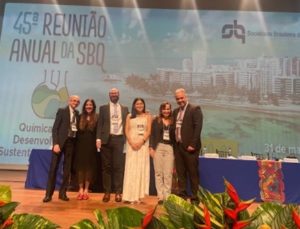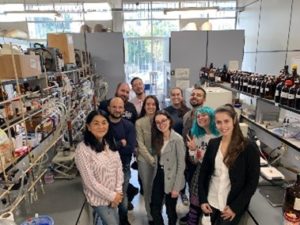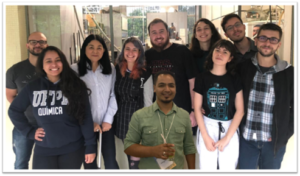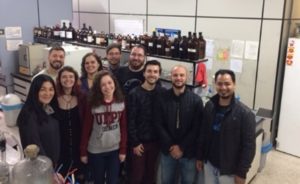We are delighted to announce that Shirley Nakagaki, one of our Editorial Board members, has been elected as president of the Brazilian Chemical Society.
This makes Shirley the second ever female researcher to be president of this society in the forty-five years it has been active. To celebrate this achievement, we asked Shirley the following questions, and we hope you find her answers as motivating as we do!
- Can you explain your area of research for a non-specialist in the area?
My main interest lies in the study (preparation, characterization and application) of molecules called metalloporphyrins. The key application of these molecules in my research group is in the preparation of compounds known as catalysts (a kind of chemical that accelerates chemical reactions) for oxidation, sequential and esterification reactions. For example, an important oxidation reaction is one that results in an acid species (adipic acid) which is one of the reactants that produces polymeric fibres like nylon. These fibres are used in a range of materials from pantyhose to very sophisticated devices that are part of the International Space Station. In some cases, the catalytic species I study and develop are inspired by biological systems that act as catalysts, in a chemical model known as biomimetic chemistry. In particular, this means that my compounds that act as catalysts can react in a similar way to enzymes, a chemical component found in very efficient biological systems that accelerate reactions necessary to keep organisms alive. In some cases, the catalytic species I study and develop are inspired by biological systems in a chemical model known as biomimetic chemistry. This means my compounds act as catalysts, in a very similar way to enzymes.
- What work are you the proudest of?
Fortunately, I can say that I am proud of all my work developed in my 30-year career in the chemical sciences. I have been a supervisor to many chemistry students, supporting them through their undergraduate projects, master’s degree dissertations and PhD theses. These projects have resulted in different products such as patents and scientific papers. However, the education of new chemistry professionals, be it researchers or chemistry professors, is probably my most important job.
- What do you find motivating?
My motivation comes from different parts. Firstly, through being a professor, my motivation comes from my students in the classroom or in the lab. When they ask me about chemistry in general or particularly inorganic chemistry, I find motivation in trying to explain to them in the best way that they can solve whatever doubts they have. Another source of motivation comes from realizing every day, and at the end of every paper I read, that there are many things we still do not know and cannot explain in the light of science, particularly in the chemical sciences. The chemical knowledge is vast and fascinating. Everything around us, in some way, involves a chemical process that can or will be explained, either now or in some distant future, based on the advance of the scientific knowledge.
- How did your career path lead you to become elected as the president of the Brazilian Chemical Society?
When I was a chemistry undergraduate student in Sao Paulo University, Ribeirao Preto city campus (countryside part of the Sao Paulo State), I joined Professor Yassuko Iamamoto’s research group with a scholarship to work in the development of catalysts for oxidation reactions. Our first research results were presented in the annual meeting of the SBQ – (Brazilian Chemical Society) of which I became an associate in 1983. After that, every year I attended the annual meeting and presented the research results of my master’s degree or PhD studies. After I finished my graduate school, I joined Federal University of Paraná (a southern state in Brazil) and created my own research group. In the SBQ I joined as a director in the inorganic chemistry division, since I believed and continue to believe that I can contribute with my work to build a strong and big Brazilian chemical society that represents the strength of the chemical science in Brazilian universities as well as Brazilian research centres.
- What will your role entail and what are you aiming to achieve?
Firstly, I believe that my role as president of the SBQ is to contribute daily to the growth of our society and to foster the good work of the previous 21 presidents. In addition, I have a big responsibility to show young chemists, graduate and undergraduate students, the importance of our society as a civil organization. They are a voice to be heard in issues in which the chemical community can contribute to the greater society. We also hope that our voice can be one that includes, fosters, and promotes quality scientific discussion, being plural, diverse and inclusive.
- What are the biggest challenges facing the Brazilian Chemistry Community?
Regarding the chemical sciences, there are many challenges we face. For one, providing quality scientific education for young people in a country with continental figures and big social and income inequalities. We find a good, international level education in one part of the country and a complete lack of basic infrastructure in other parts. Regarding the scientific research, we face low and declining levels of investment, which affects the continuity of good research programs. We face many challenges to become the country we dream of.
- What are the most exciting areas in the Brazilian Chemistry Community?
We have many strong research areas in Brazil. These include using natural products to explore our big biodiversity, the preparation and use of new materials, and we have excellent researchers making contributions to the new and alternative energies. In addition, given our great natural resource reserve, we have brilliant researchers working on the extraction of new substances from our biodiverse biomes and developing new pharmacological alternatives from these results. Some of these natural findings are already being prepared in our universities. Our scientific community is very versatile and creative. Despite receiving little financial support, we have produced excellent results. This can be seen in the quality of our Brazilian researchers’ publications around the world. For example, I can quote the Brazilian Science Panorama 2015-2020 report from the Science, Technology and Innovation Observatory (CGEE- OCTI), which shows the Brazilian production of scientific research papers grew 32% in 2020 in comparison to 2015, while the global production only grew 27%. During these five years more than 11 million papers were indexed in Web of Science (WoS), of which 372 thousand are papers with at least one author linked to our Brazilian institutions, giving us the 13th position in global production, surpassing Russia (14th), Iran (15th), the Netherlands (16th) and Turkey (17th). In 2020, this participation reached 3.2% of global scientific research production. These figures are considering scientific papers as a whole, but according to WoS, chemistry is the second area of research in number of indexed papers, lagging only behind the engineering area. These are very relevant figures as it shows the strength of chemistry in Brazilian scientific research, which is concentrated mostly in public universities where our SBQ associates work.
- How does it feel being the 2nd woman to hold this position and how is this going to inspire a younger generation of female chemists?
I can see in our long line of SBQ female associates so many chemists that could be in my place. Women are about 50% of all SBQ associates. We have excellent scientists, chemical educators and researchers in our pool of associates. I am not the first female president; I am only the second one in this rough path opened by Prof. Vanderlan Bolzani. But, paraphrasing vice-president Kamala Harris, “I will make sure I will not be the last”. Hopefully, my work will serve as an example and inspiration so that women in SBQ can see that it is possible to be in my position and occupy this space, if we serve with dedication and love to the SBQ.
- You have been a member of the RSC Advances Editorial Board since September 2020. What would you say are the biggest strengths of the journal?
Being a member of the RSC Advances Editorial Board has been an interesting and significant experience, considering the size and relevance of the RSC to the world and to the SBQ. Through the years both societies have not only kept good relations but developed key partnerships of research. From my remote participation on the meetings (due to the new coronavirus pandemic) I gathered that the main interest of this journal is to deliver papers of unquestionable scientific quality through an open access journal. On this aspect, the journal invests greatly in its editorial board, giving them adequate support for their job. Moreover, I found it very positive the journal’s actions towards making it more inclusive and transparent.
- What do you hope to achieve in your career over the next 10 years?
What I hope to achieve in my career over the next 10 years is continuous progress both from scientific and educational standpoints. I hope to continue to investigate multifunctional catalytic solids aimed at sequential reactions as opposed to single process catalysts. I believe they are more adequate alternatives considering the reduction in cost, time and use of available resources during the preparation of reactions. Furthermore, shaping new generations of chemists has always been a career goal of mine, so I hope I can continue to give classes and participate in the education and formation of professionals in this area of science that is dear to my heart, Chemistry!
Please join me in extending our congratulations to Shirley for this achievement. We hope you continue to inspire the next generation of chemists!















